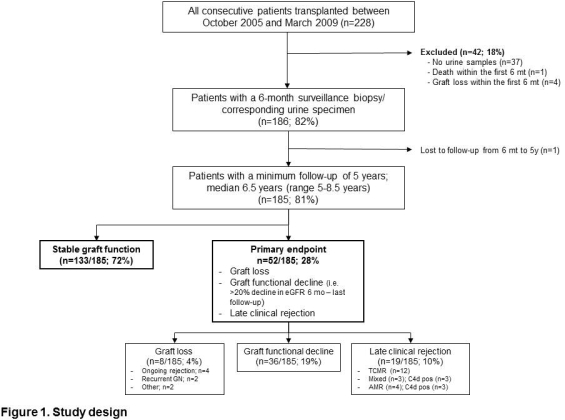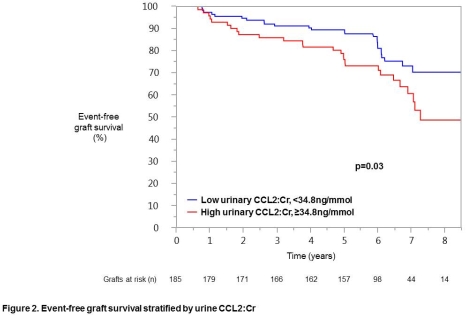Six-Month Urinary CCL2 Levels Predict Long-Term Renal Allograft Outcome
1Internal Medicine, Nephrology, University of Manitoba, Winnipeg, MB, Canada
2Transplantation Immunology & Nephrology, University Hospital, Basel, Basel, Switzerland.
Meeting: 2015 American Transplant Congress
Abstract number: B102
Keywords: Graft survival, Kidney transplantation, Non-invasive diagnosis, Renal dysfunction
Session Information
Session Name: Poster Session B: Kidney Complications: Late Graft Failure
Session Type: Poster Session
Date: Sunday, May 3, 2015
Session Time: 5:30pm-6:30pm
 Presentation Time: 5:30pm-6:30pm
Presentation Time: 5:30pm-6:30pm
Location: Exhibit Hall E
Graft loss is a major cause of morbidity and mortality. We have shown that 6-month urine CCL2 is an independent predictor for death-censored graft loss. The goal of this study was to validate early urine CCL2 as a predictor of long-term graft outcomes in an independent cohort.
We evaluated a prospective, observational adult renal transplant cohort (n=185) with a 6-month surveillance biopsy/corresponding urine, and a minimum 5-year follow-up. Urine CCL2 was measured by ELISA and corrected with urine creatinine. The primary outcome was a composite of graft loss; renal function decline (>20% decrease eGFR between 6-months and last follow-up); and biopsy-proven late rejection.
The primary outcome was reached in 52/185 (28%) patients. Urine CCL2:Cr was significantly higher in these patients compared to those with stable graft function [median 38.6ng/mmol (IQR 19.7-72.5) vs. 25.9ng/mmol (IQR 16.1-45.8), p=0.009]. In a multivariate Cox-regression model, independent predictors of the primary outcome were high CCL2:Cr levels (HR 1.01, 95%CI 1.00-1.02, p=0.01) and total HLA-mismatch (HR 1.28, 95%CI 1.03-1.60, p=0.03); while pre-transpant DSA, donor age, 6-month proteinuria and early acute rejection were not significant (p≥0.20). Low urine CCL2:Cr <34.8ng/mmol was associated with a 90% 5-year event-free survival compared to 76% with high urinary CCL2 ≥34.8ng/mmol (p=0.03).
This study confirms in an independent, prospective cohort that 6-month urinary CCL2 is a non-invasive, independent predictor of long-term renal allograft outcomes. Early identification of those at risk for poor long-term outcomes could streamline them for more intensive post-transplant monitoring and avoidance of drug minimization/withdrawal protocols.


To cite this abstract in AMA style:
Ho J, Rush D, Gao A, Hopfer H, Wiebe C, Nickerson P, Schaub S, Hirt-Minkowski P. Six-Month Urinary CCL2 Levels Predict Long-Term Renal Allograft Outcome [abstract]. Am J Transplant. 2015; 15 (suppl 3). https://atcmeetingabstracts.com/abstract/six-month-urinary-ccl2-levels-predict-long-term-renal-allograft-outcome/. Accessed February 13, 2026.« Back to 2015 American Transplant Congress
